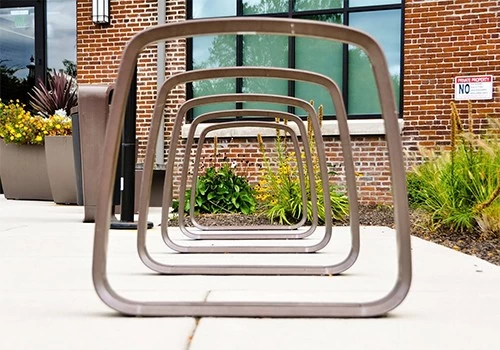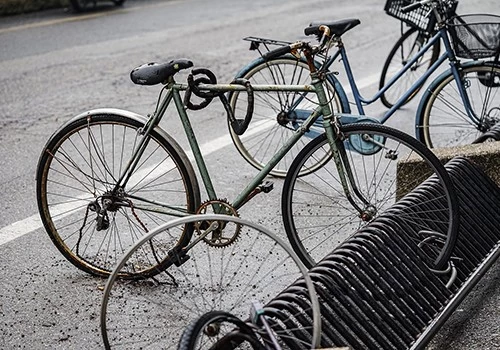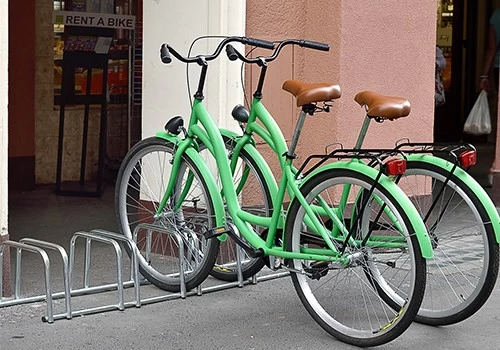Specifications
Model Number : PV-SC-001
Type: Bike parking and storage
Color:Yellow,Black,Green,Red,or Customized.
Style : both indoors and outside
Material : carbon steel
Loading: According to customer need
Size :195*23.2*75cm,200.55*23.2*75cm,or Customized.
Finish: hot-galvanized
Specifications
Model Number : PV-0081-01
Type: Bike parking and storage
Color:silver
Style : both indoors and outside
Material : carbon steel
Loading: According to customer need
Size :Height 1463mm, Depth 1114mm
Finish: hot-galvanized
Model Number : PV-0081-01
Type: Bike parking and storage
Color:Black
Style : both indoors and outside
Material : carbon steel
Loading: 2-10 bikes (According to customer need)
Size :Height 1463mm, Depth 1114mm
Finish: hot-galvanized
Model No.: PV-H1
Size: w605*D400*H330mm
Specification: Round tube:¢16*1.2mm
Finish: Power coated
Net Weight: 1.6 kgs
Packing size:6pcs/ctn
MOQ: 100pcs
Model Number : PV-0024-01
Material : carbon steel/stainless steel
Loading: according customer space size,we can design according the size
Size : W1977*D1130(depend on your parking space)*H2500mm
Finish: Powder coated ,hot-galvanized/electric polish
Packing size :2000*2000*2500mm(40 parking space )
Powder coated ,hot-galvanized/electric polish
Product number:PV-0046-01
Material:carbon steel
Specification:10.2*59*28CM or Customized.
MOQ:100PCS
Port:Shanghai
Trademark:PV
Model Number : PV-0081-01
Type: Outdoor Bike Parking Rack
Style : both indoors and outside
Material : carbon steel
Loading: 2-10 bikes (According to customer need)
Size :170.5*116*148CM
Finish: hot-galvanized
Model Number : PV-0055-01
Type: compact flat pack /slot
Color:black / silver /yellow/optional
Style :Outdoor/indoor
Material : carbon steel/ stainless steel
Capacity : park 6 bikes
Size : L1400*W1054*H840mm
Net weight :38KG
Finish: powder coating / hot galvanized /elctropolishing
Packing size :1490*860*160mm 1pcs/ctn
Product Name: Multi-Capacity Horizontal Two Tier Bike Parking Rack
Material: Carbon Steel
Finish: Powder coated
Post: 80mm * 80mm thickness: 3mm
Steel plate: thickness: 2mm
Dimension: 1325*1890*1830mm
Weight: 370 kg/set
Model: PV-0067-01
Material: stainless steel 304
Pipe: 50 mm* 2.5 mm
Size: 900*700 mm(L*W)
Surface treatment: polishing

As cities around the world face growing challenges related to congestion, pollution, and sustainability, urban cycling is emerging as a powerful solution to many of these issues. More than just a trend, cycling is increasingly seen as a viable, healthy, and eco-friendly mode of transport. However, the success of cycling as a mainstream mode of transportation depends largely on the infrastructure that supports it—chiefly, the availability of secure and accessible bike parking. In this context, outdoor bike racks play a crucial role in promoting urban cycling and ensuring its long-term viability.
This article explores the various ways outdoor bike racks contribute to urban cycling, examining their role in facilitating cycling as a primary mode of transport, their impact on the urban environment, and the key considerations for effective bike rack design and placement.
Over the last few decades, cities have been experiencing a resurgence in cycling, driven by factors such as environmental concerns, the need for cost-effective transportation, and increasing health awareness. The global shift towards more sustainable and active forms of travel has brought cycling to the forefront of urban mobility. According to the World Health Organization (WHO), cycling can help reduce pollution, alleviate traffic congestion, and improve public health. As a result, urban planners and local governments are beginning to prioritize cycling infrastructure, recognizing the multitude of benefits it offers.
However, while cycling is becoming more popular, many cities still lack the proper infrastructure to support cyclists, particularly when it comes to safe and reliable bike parking. Without proper facilities, cyclists are often forced to lock their bikes to street furniture, lampposts, or railings—leading to potential damage, theft, and inconvenience. This is where outdoor bike racks come into play.
Outdoor bike racks are an essential component of any cycling-friendly urban environment. They provide cyclists with a safe and convenient place to store their bikes, whether they are commuting to work, running errands, or enjoying recreational rides. The presence of well-designed bike racks encourages cycling by reducing barriers to bike ownership and use.
One of the primary concerns for cyclists is the security of their bikes. With the rise of bike theft in cities around the world, many potential cyclists hesitate to invest in a bike due to the fear of losing it. According to the National Bicycle Dealers Association, bike theft is one of the most common deterrents to bike ownership. Outdoor bike racks provide a secure environment for cyclists to lock their bikes with high-quality, durable locks, reducing the risk of theft and giving cyclists peace of mind.To enhance security, many modern bike racks are designed with features that allow for multiple locking points, ensuring that both the frame and wheels are securely fastened. Some bike racks also offer integrated anti-theft technologies, such as tamper-resistant bolts or RFID-enabled locks, further reducing the risk of theft and vandalism.
By making bike parking accessible and safe, outdoor bike racks play a significant role in encouraging more people to choose cycling as their preferred mode of transport. For many commuters, the availability of secure and convenient bike parking is a deciding factor in whether they opt for a bike ride or drive a car. Without sufficient parking options, cyclists may be discouraged from taking their bikes out of fear of having nowhere to store them upon reaching their destination.
Outdoor bike racks also promote cycling among those who might otherwise rely on public transport or private vehicles. When bike racks are located in key areas—near transportation hubs, retail centers, and residential neighborhoods—cyclists can easily combine cycling with other modes of transport, such as taking their bike on a train or bus. This "multi-modal" approach helps reduce dependence on cars, ultimately contributing to reduced traffic congestion and pollution.
Cycling is a highly sustainable form of transportation. Unlike cars and public buses, bikes do not emit carbon dioxide or other harmful pollutants, making them an ideal alternative to more carbon-intensive modes of transport. By encouraging cycling through the installation of outdoor bike racks, cities can significantly reduce their carbon footprint and work toward achieving sustainability goals.
According to a study by the European Cyclists’ Federation, cycling could reduce urban air pollution by up to 11%. This reduction is especially important in densely populated cities where air quality is a growing concern. Moreover, cycling infrastructure such as bike racks reduces the need for large, space-consuming parking lots and garages, which are often paved over large expanses of land. The result is a reduction in impervious surfaces, leading to better stormwater management and a decrease in urban heat islands.

Outdoor bike racks are not just practical amenities—they also contribute to the aesthetic and social fabric of urban spaces. Properly placed bike racks can enhance the visual appeal of an area and make it more inviting for cyclists and pedestrians alike.
The presence of bike racks signals to the public that cycling is an accepted and supported mode of transport. In many cities, bike racks have become an integral part of public spaces, contributing to their liveliness and vibrancy. When bike racks are strategically located near cafes, shops, parks, and transportation hubs, they attract cyclists and pedestrians alike, turning these areas into lively hubs of activity.
By designing bike racks that complement the aesthetics of their surroundings, cities can ensure that bike parking doesn’t detract from the beauty of public spaces. Custom-designed bike racks, such as those that integrate art or unique shapes, can add an artistic touch to urban spaces, making bike racks not only functional but visually appealing as well.
Bike racks are essential in improving urban mobility by connecting cyclists to other modes of transportation, such as buses, subways, and trains. In cities with well-developed multi-modal transport systems, bike racks are often located at key transportation hubs, making it easier for commuters to combine cycling with public transport. This promotes greater flexibility in travel, as cyclists can take their bikes on public transport for longer journeys or store their bikes securely while they continue their travels on foot or by public transport.
Additionally, bike racks help address the challenge of bike storage in dense urban areas, where space is often limited. By providing centralized, well-maintained parking spaces for bikes, cities can maximize the efficient use of public space without sacrificing the needs of pedestrians or motorists. Bike racks can be integrated into urban design strategies that prioritize both environmental sustainability and quality of life for residents and visitors.
To maximize the impact of outdoor bike racks, it's important to consider various factors in their design and placement. Well-designed bike racks can encourage more people to cycle, while poorly designed or poorly placed racks can become a deterrent.
The security of a bike rack is paramount. Cyclists need to feel confident that their bikes will be safe when left unattended. As mentioned earlier, incorporating multiple locking points, tamper-resistant features, and anti-theft technologies can enhance the security of bike racks. Additionally, racks should be made from durable, weather-resistant materials, ensuring they can withstand the elements and provide long-lasting protection.
Bike racks should be easily accessible and placed in convenient locations. High-traffic areas such as transit stations, commercial centers, and residential neighborhoods are ideal places for bike racks. Accessibility also means ensuring that bike racks are designed to accommodate a wide range of bicycles, from traditional road bikes to electric bikes and cargo bikes.
Urban spaces are often limited, so it's essential to design bike racks that maximize available space without overcrowding. Modular and flexible bike rack systems are particularly effective in areas with high demand for bike parking. These systems can be expanded or rearranged as needed, ensuring that the number of available spaces matches the growing demand for cycling infrastructure.
Outdoor bike racks are exposed to the elements, so they must be designed to withstand harsh weather conditions, including rain, snow, and extreme heat. Materials such as galvanized steel, stainless steel, and powder-coated finishes are commonly used for their durability and resistance to rust and corrosion.

As urban cycling continues to gain popularity, the demand for effective bike parking solutions is likely to increase. Future innovations in bike rack design could include smart racks equipped with technology that provides real-time availability updates, mobile app integration, and enhanced security features. Additionally, the rise of electric bikes (e-bikes) will likely influence the design of bike racks to accommodate the specific needs of these vehicles, including charging stations and larger storage spaces.
Governments and urban planners will also need to continue investing in bike parking infrastructure, ensuring that it evolves alongside the growth of cycling as a mainstream mode of transport. As cities work toward achieving sustainability goals and reducing traffic congestion, outdoor bike racks will play an essential role in creating safer, more connected, and more sustainable urban environments.
Outdoor bike racks are more than just functional tools—they are essential components of a successful urban cycling strategy. By providing secure, accessible, and convenient parking for cyclists, bike racks encourage more people to choose cycling as a daily mode of transport. As cities continue to prioritize sustainability and mobility, investing in well-designed bike racks will help build the infrastructure needed to support cycling and reduce the environmental impact of urban transport.
By promoting cycling through effective bike parking solutions, cities can reduce traffic congestion, improve air quality, and create more vibrant and livable urban environments. As the demand for sustainable transportation options grows, outdoor bike racks will play an increasingly important role in shaping the future of urban mobility.